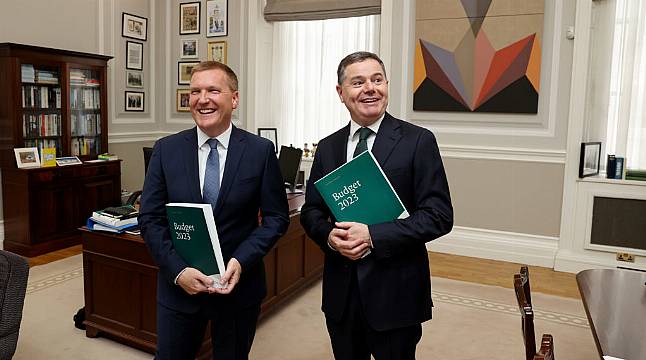Main take-aways
- Social welfare payments will rise across the board by €12 for working-age recipients
- €12 increase in weekly payments for pensioners
- Working Family Payment threshold will increase by €40
- €2 increase in the weekly rate for a Qualified Child
- Boosts in Fuel Allowance
- Various once-off cost-of-living crisis payments
Social welfare payments across the board will rise by €12 per week for working-age recipients, Minister for Public Expenditure Michael McGrath announced on Tuesday.
Pensioners will also see a €12 boost to their welfare payments.
The Working Family Payment threshold will increase by €40, as well as a €2 weekly increase in the rate for a Qualified Child.
Read more: Main points from Budget 2023
Effective from January 1st, the qualifying income threshold for the Fuel Allowance will increase from €120 to €200 above the relevant rate of the State Pension Contributory.
For over 70s, the weekly fuel allowance limit will rise to €500 to a single person, and €1,000 for a couple.
"The Fuel Allowance is a very effective means of targeting support at people who need help with energy bills," Mr McGrath said in the Dáil on Tuesday.
The Government will also introduce a raft of once-off cost-of-living crisis welfare payments.
Included in these payments are: a €500 lump sum for families availing of the Working Family payment, a €500 lump sum for carers, a €500 cost of disability payment and a €20 increase in the domiciliary care allowance for sick children.
Cost-of-living supports
As well as these payments, in October, those in receipt of a weekly social welfare payment will receive a 'Cost-of-Living support' payment.
Top-up payments for participants of the Community Employment scheme, TÚS and Rural Social Scheme will increase to €25.
"Taken together, the measures we are rightly introducing this year and in 2023 represent very substantial State support for the most vulnerable," Mr McGrath said during his speech.
"By means of example - a single pensioner, living alone, in receipt of Fuel Allowance will receive an additional €2,375 between now and the end of 2023 as a result of the announcements I am making today."
Mixed reaction
Dr Tricia Keilthy, head of social justice at St Vincent DePaul, criticised the Government's approach to welfare payments in the budget.
"The cost of living measures such as the one-off Fuel Allowance payment and double social welfare payment will help low-income households during what will be a very difficult winter, but they are only temporary.
"The increases in core social welfare rates do not cover the rise in the cost of living," she said.
"Increasing social welfare rates by €20 would have provided better support for individuals and families trying to get by on a very low income and helped prevent the damage caused by poverty in the longer term.

"The failure to address the impact of inflation on low-income households beyond short-term measures puts many people at risk of being pulled further into the kind of grinding daily hardship that is very difficult to escape," she added.
Catherine Cox, head of communication with Family Carers Ireland, criticised "once-off interventions" in the budget, rather than "sustained solutions".
"We are disappointed that the budget did not allow a more fundamental review of how the State categorises, compensates and values family carers as set out in our pre-budget submission, including fundamental reform of the means test, but we hope to engage with the Minister on this over the coming months.
"We cautiously welcome additional funding towards respite, day services and residential places in respect of Disability, Older Persons and Mental Health services but await further details on these measures," she said.







